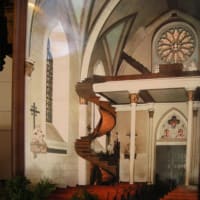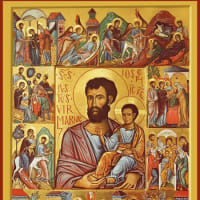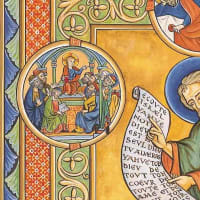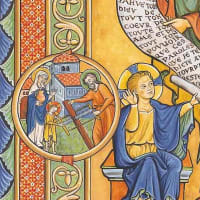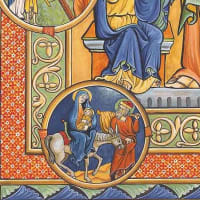アヴェ・マリア・インマクラータ!
愛するM君、
前回は、ヨハネ二十二世のケースを取り上げました。
前回までの要点は、
*教皇が不可謬性の保証を行使することが出来るのは、限られた場合に限る。その内の一つは、教義の決定を全世界に信ずべき信仰箇条として強制することである。
*ヨハネ二十二世は「質料的教義」に反する異端を教皇としての公の教えは、全キリスト世界を混乱させた(totus mundum christianum turbaverunt)。異端説を全教会に押しつけようとした。「しかし自分の死により、それを完成させることが出来なかった」(ベネディクト十二世教皇tamen morte praeventus,(…)perficere id nequivit)。
*ヨハネ二十二世は、死ぬ前日(1334年12月3日)に自分の主張を撤回し、後継者ベネディクト十二世は、不可謬的にヨハネ二十二世の教えと反対をカトリック信仰のドグマとして定義した。
*聖ロベルト・ベラルミンも、ヨハネ二十二世は異端的な説を、真理として信徒らに強制しようという意向を持って、それを支持したが、ドグマとして定義することが出来る前に死亡した、と書いている。
*ヨハネ二十二世の正統ではない教え(heterodox teaching)は、教会の信仰に関する通常の教導権(ordinary magisterium)の執行であったが、定義をするものではなかったので、不可謬ではなかった。
*教皇アドリアノ四世はヨハネ二十二世のことを「異端者」であると呼んだ。
さて、今回は、教皇オノリオ(ホノリウス)のケースを紹介します。
カトリック教会の習わしでは、教皇や聖人の名前の日本語は、教会ラテン語の読み方に従い、奪格で書き表されます。たとえば、ピオ十二世とかパウロ六世とかベネディクト十六世とかアウグスティノ、アンブロジオなどです。
それに従えば、Honoriusは、オノリオとなりますが、ヨハネ二十三世とかヨハネ・パウロ二世とか、必ずしもHの発音は省略するとは限らないことを考え、また古代の人名では必ずしも奪格が慣習とは限らない(たとえばアリウスなど)ことを考慮して、ここでは教皇ホノリウスと表記します。
教皇ホノリウス (625-638) は、異端に陥ったのみならず、カトリック教会によって公式に異端者であると断罪された教皇です。
教皇ホノリウスは、単意論(Monothelites)という異端を広めました。単意論とは、キリストには一つしか意志がないと主張する異端です。(カトリックの教えによれば、キリストは真の天主かつ真の人間なので、キリストには天主の本性と人間の本性の二つが完全にあり、従って、天主としての意志と人間としての意志の二つがあります。)
既に教皇大聖レオが、449年には、キリストにおいて、天主と人間との二つの本性が一致していることを定義しており、ここからキリストに天主と人間との二つの意志があると言うことが出来ました。また、キリストのペルソナ(ヒポスタティス)において、二つの本性が結合していることが、451年にカルケドン公会議によって再度確認されていました。
しかし、教皇ホノリウスは、コンスタンティノープルの総大司教セルジウス一世(Sergius I)への複数の公式な書簡の中で、単意論を教えました。
教皇の手紙が書かれたその当時、聖ソフロニウス(St Sophronius)は、単意論の異端に反対して公に反対しており、教皇ホノリウスは、エルサレムの司教であった聖ソフォロニウスを断罪しました。(しかし第三コンスタンティノープル公会議は、ホノリウスを断罪し、聖ソフォロニウスの名誉を回復させます。)
セルジウス一世(Sergius I)への書簡の一つにおいて、教皇ホノリウスは次のように書いています。
「教会の定義するドグマについて、キリストにおいて二つの本性があると信仰告白しつつも、我々は天主と人間との仲介者キリストにおいて一つ或いは二つのはたらきがあるかを決定的に語ってはならない。」(Migne, Pope Honorius I, “Epistola ad Sergium,” Patrologia Latina, vol. 80, col. 475.)

つまり、教皇ホノリウスは、単意論の異端説を前にして、真理と誤謬とを同じレベルに取り扱い、真理を擁護せずに、信仰において「兄弟らを固める」という教皇の職務を拒否しました。(真理と誤謬を同列におくことによって、真の宗教であるカトリックと、その他の諸宗教とを同じレベルにおく第二バチカン公会議後の教皇らと同じ態度をとりました。)
これは、とどのつまり、誤謬を認めるということです。何故なら、教皇聖フェリックス(483-492)によれば「誤謬に反対しないことは、それを認めることである、真理を擁護しないことは、真理を廃止することである」からです。
教皇ホノリウス (625-638) が単意論の異端に対して取った行動のために、或いは必要な行動を取らなかったために、カトリック教会の三つの公会議によって異端者として正式に排斥されています。すなわち、
*第三コンスタンティノープル公会議 (680-681)
*第二ニケア公会議(787)
*第四コンスタンティノープル公会議(869-870)
です。
さらに、これらの三つの公会議に加えて、コンスタンティノープルのドーム(Trullo)の地方教会会議(692)においても異端者だと断罪されました。
まず、第三コンスタンティノープル公会議の第十三総会(681年3月28日)での決議文を見てみます。
「コンスタンティノープルのセルジウスが、ファシスのキルスに宛てた、そして教皇ホノリウスに宛てた教義の書簡らを我々が読んだ後、さらに、教皇ホノリウスがセルジウス宛てに書いた書簡を読むと、これらの書簡[ホノリウスからの書簡も含む]は使徒継承の教義にとって極めて遠く離れており、[過去の]聖なる公会議の宣言とも異なっており、著名で認められた教父たちからも離れている。彼らは異端者らの偽りの教えに従っている。従って、我々は彼らを全く拒否し、霊魂に害を与えるものであるとexecrateする。
しかし、これらの人々の名前も、聖なる教会から追放されなければならない。すなわり、セルジウスの名前(…)我々は彼らすべてを排斥する。
彼らと共に、我々の全会一致の教令は、ホノリウス、古いローマの元教皇が教会から追放され、排斥されなければならないとする。何故なら、彼のセルジウス宛ての手紙において見いだしたことは、すべての点において、彼がセルジウスの見解に従い、彼の邪悪な教えに同意したからだ。(…)」
英語訳は次にあります。[Fr. Charles Joseph von Hefele, A History of the Councils of the Church, from the Original Documents, vol. V, pp. 166-167.]
“After we had read the doctrinal letters of Sergius of Constantinople to Cyrus of Phasis and to Pope Honorius, as well as the letter of the latter to Sergius, we find that these documents [including the letter from Honorius] are quite foreign to the apostolic dogmas, also to the declarations of the holy Councils, and to all the accepted Fathers of repute, and [that they] follow the false teachings of the heretics; therefore we entirely reject them, and execrate them as hurtful to the soul. But the names of these men must also be expelled from the holy Church, namely, that of Sergius (…)
We anathematized them all. And along with them, it is our unanimous decree that there shall be expelled from the Church and anathematised, Honorius, formerly Pope of Old Rome, because of what we found in his letter to Sergius that in all respects he followed his view and confirmed his impious doctrines…”
同様の文章は、Philip Schaff の作った資料文章でも読めます。
同じ文章ですが、翻訳の微妙な違いを含めて、転載します。
The holy council said: After we had reconsidered, according to our promise which we had made to your highness, the doctrinal letters of Sergius, at one time patriarch of this royal god-protected city to Cyrus, who was then bishop of Phasis and to Honorius some time Pope of Old Rome, as well as the letter of the latter to the same Sergius, we find that these documents are quite foreign to the apostolic dogmas, to the declarations of the holy Councils, and to all the accepted Fathers, and that they follow the false teachings of the heretics; therefore we entirely reject them,and execrate them as hurtful to the soul. But the names of those men, whose doctrines we execrate, must also be thrust forth from the holy Church of God, namely, that of Sergius some time bishopof this God-preserved royal city who was the first to write on this impious doctrine; also that of Cyrus of Alexandria, of Pyrrhus, Paul, and Peter, who died bishops of this God-preserved city, and were like-minded with them; and that of Theodore sometime bishop of Pharan, all of whom the most holy and thrice blessed Agatho, Pope of Old Rome, in his suggestion to our most pious and God-preserved lord and mighty Emperor, rejected, because they were minded contrary to ourorthodox faith, all of whom we define are to be subjected to anathema.
And with these we define that there shall be expelled from the holy Church of God and anathematized Honorius who was some time Pope of Old Rome, because of what we found written by him to Sergius, that in all respects he followed his view and confirmed his impious doctrines. We have also examined the synodal letter of Sophronius of holy memory, some time Patriarch of the Holy City of Christ our God, Jerusalem, and have found it in accordance with the true faith and with the Apostolic teachings,and with those of the holy approved Fathers.Therefore we have received it as orthodox and as salutary to the holy Catholic and Apostolic Church, and have decreed that it is right that his name be inserted in the diptychs of the Holy Churches.
次に、第三コンスタンティノープル公会議の第十六総会(681年8月9日)の宣言を紹介します。
[公会議教父たちは一斉に唱える]
皇帝万歳!われらの偉大な皇帝コンスタンティノ万歳!(…)
ローマの教皇アガト万歳!コンスタンティノープルの総大司教ジョルジオ万歳!アンティオキアの総大司教テオファノ万歳!(…)
異端者、ファランのテオドロスに排斥あれ!
異端者セルジウスに排斥あれ!
異端者シルスに排斥あれ!
異端者ホノリウスに排斥あれ!
異端者ピルスに排斥あれ!(…)
すべての異端者どもに排斥あれ!
異端者の側にいるすべての者どもに排斥あれ!
願わくはキリスト者らの信仰が増さんことを。正統な世界教会会議万歳!
英語訳はここにあります。Session XVI. (Labbe and Cossart, Concilia, Tom. VI., col. 1010.)
[The Acclamations of the Fathers.]
Many years to the Emperor! Many years to Constantine, our great Emperor! Many years to the Orthodox King! Many years to our Emperor that maketh peace! Many years to Constantine, a second Martian! Many years to Constantine, a new Theodosius! Many years to Constantine, anew Justinian! Many years to the keeper of the orthodox faith! O Lord preserve the foundation of the Churches! O Lord preserve the keeper of the faith!
Many years to Agatho, Pope of Rome! Many years to George, Patriarch of Constantinople! Many years to Theophanus, Patriarch of Antioch! Many years to the orthodox council! Many years to the orthodox Senate!
To Theodore of Pharan, the heretic, anathema!
To Sergius, the heretic, anathema!
To Cyrus,the heretic, anathema!
To Honorius, the heretic, anathema!
To Pyrrhus, the heretic, anathema!
To Paul the heretic, anathema!
To Peter the heretic, anathema!
To Macarius the heretic, anathema!
To Stephen the heretic, anathema!
To Polychronius the heretic, anathema!
To Apergius of Perga the heretic, anathema!
To all heretics, anathema!
To all who side with heretics, anathema!
May the faith of the Christians increase, and long years to the orthodox and Ecumenical Council!
第三コンスタンティノープル公会議の第十八総会(681年9月16日)の決議文を紹介します。
「天主の恩寵により、集められた聖なる偉大な公会議と、最も敬虔で信仰深く力ある皇帝コンスタンティノの宗教勅令とは、この天主により守られた王の都市、新しいローマであるコンスタンティノープルの、トゥルロと呼ばれる皇帝の宮殿の高間(ドーム)において、次のことを定めた。(…)
聖なる公会議はさらに言う。この[上に述べた]、天主の聖寵による、敬虔で正統な信仰宣言は、正統信仰の充分な知識と確証に足りるものだったろう。しかし、原初に蛇の助けを借りて人類の上に死の毒をもたらした悪の作者[悪魔]は、止めることなく、今度は同じように、自分の意志するところを働くために相応しい道具を見つけた。
[この道具として]我々の意図する者どもは、ファランの司教であったテオドルス、セルジウス、ピルス、この王都の大司教らであったパウロとペトロ、更には、古きローマの教皇であったホノリウス(ἔτι δὲ καὶ Ὁνώριον τὸν γενόμενον πάπαν τῆς πρεσβυτέρας Ῥώμης, insuper et Honorium qui fuit papa antiquae Romae)、アレキサンドリアの司教キルス、後にアンティオキアの司教となったマカリウスとその弟子ステファノらである。悪魔は彼らを積極的に使って、全教会にとってつまずきの石を築き上げた。我らの真の天主、聖三位一体の一位である、キリストの二つの本性における一つの意志(one will)、一つのはたらき、という躓きの石(stumbling-blocks)である。(…)」
*英語では次で読めます。
The Definition of Faith.
(Found in the Acts, Session XVIII., L. and C., Concilia, Tom. VI., col. 1019.)
*或いは、次でも(英語とギリシア語で)読めます。
THE THIRD COUNCIL of CONSTANTINOPLE (692) The Sixth Ecumenical Council
*或いは、次でも、英語とラテン語で読めます。
Oecumenicum Concilium VI 680/681 AD, Concilium Constantinopolitanum III, 147 patres
英語を引用します。
The holy, great, and Ecumenical Synod which has been assembled by the grace of God, and the religious decree of the most religious and faithful and mighty Sovereign Constantine, in this God-protected and royal city of Constantinople, New Rome, in the Hall of the imperial Palace, called Trullus, has decreed as follows.(…)
The holy and Ecumenical Synod further says, this pious and orthodox Creed of the Divine grace would be sufficient for the full knowledge and confirmation of the orthodox faith. But as the author of evil, who, in the beginning, availed himself of the aid of the serpent, and by it brought the poison of death upon the human race, has not desisted, but in like manner now, having found suitable instruments for working out his will (we mean Theodorus, who was Bishop of Pharan, Sergius, Pyrrhus, Paul and Peter, who were Archbishops of this royal city, and moreover, Honorius who was Pope of the elder Rome, Cyrus Bishop of Alexandria, Macarius who was lately bishop of Antioch, and Stephen his disciple), has actively employed them in raising up for the whole Church the stumbling-blocks of one will and one operation in the two natures of Christ our true God, one of the Holy Trinity; thus disseminating, in novel terms, amongst the orthodox people, an heresy similar to the mad and wicked doctrine of the impious Apollinaris, Severus, and Themistius, and endeavouring craftily to destroy the perfection of the incarnation of the same our Lord Jesus Christ, our God, by blasphemously representing his flesh endowed with a rational soul as devoid of will or operation.(…)
第三コンスタンティノープル公会議の閉会の前に教皇聖アガト(St. Agatho)が帰天したので、その後継者である教皇聖レオ二世(681-683)がこれを承認しました。
教皇聖レオ二世は、公会議の教令を公式に確認してこう書簡を書きました。
「我々は、新しい誤謬の創始者ども、すなわち、テオドシウス、セルジウス、(…)そしてこの使徒継承の教会を使徒継承の聖伝の教えを持って聖化しようとせず、その代わりに世俗の裏切りによってその純粋性を汚されることを許したホノリウスを、排斥する。」
“We anathematize the inventors of the new error, that is, Theodore, Sergius, ... and also Honorius, who did not attempt to sanctify this Apostolic Church with the teaching of Apostolic tradition, but by profane treachery permitted its purity to be polluted.”
[The Catholic Encyclopedia (1913), vol. VII, p. 452.]
皇帝への大宣言(Prosphoneticus)
「しかし我々は、すべての余分な新奇なことども及びその発明者どもを教会から追放し、正しく排斥した。すなわち、ファランのテオドシウス、セルジウスとパウロ、ピルス、ペトロ(彼らはコンスタンティノープルの大司教であった)さらに、アレキサンドリアの司祭職を受けたキルス、そして彼らと共に、ローマの統治者 (πρόεδρον) であったホノリウスであり、それはホノリウスがこれらのことにおいて彼らにしたがったからである。
The Prosphoneticus to the Emperor.
(…)
but we cast out of the Church and rightly subject to anathema all superfluous novelties as well as their inventors: to wit, Theodore of Pharan, Sergius and Paul, Pyrrhus, and Peter (who were archbishops of Constantinople), moreover Cyrus, who bore the priesthood of Alexandria, and with them Honorius, who was the ruler (πρόεδρον) of Rome, as he followed them in these things. …
ディキンバラと呼ばれたところの近くにあった大教会の第三アトリウムに掲示された皇帝の勅令からの引用
「(…)皇帝が以前の五つの公会議を認めたように、彼はすべての異端者どもを排斥した。魔術師シモンから始まって、特に新しい異端の組織者と保護者どもを。テオドシウスとセルジウス、また、これらの異端者どもの支持者であり保護者であり確信者である古いローマの教皇であったホノリウスをも。(…)」
*英語はここです。The Imperial Edict Posted in the Third Atrium of the Great Church Near What is Called Dicymbala.
*あるいは、ギリシア語とラテン語では次で読めます。1445ページの真ん中ぐらいからはじまります。1457ページに核心的な部分があります。
Edictum piissimi, & Christi amantis Imperatoris Constantini, propositum in tertio atrio sanctissimæ magnae ecclesiae prope aulam, quæ Dicymbala vocatur
"The heresy of Apollinaris, etc., has been renewed by Theodore of Pharan and confirmed by Honorius, sometime Pope of Old Rome, who also contradicted himself. Also Cyrus, Pyrrhus, Paul, Peter; more recently. Macarius, Stephen, and Polychronius had diffused Monothelitism.
He, the Emperor, had therefore convoked this holy and Ecumenical Synod, and published the present edict with the confession of faith, in order to confirm and establish its decrees. (There follows here an extended confession of faith, with proofs for the doctrine of two wills and operations.) As he recognized the five earlier Ecumenical Synods, so he anathematized all heretics from Simon Magus, but especially the originator and patrons of the new heresy, Theodore and Sergius; also Pope Honorius, who was their adherent and patron in everything, and confirmed the heresy (Ad haec et Honorium, qui fuit antiquae Romae Papa, horum haereticos in omnibu factorum, concurforem, atque confirmatorem), further, Cyrus, etc., and ordained that no one henceforth should hold a different faith, or venture to teach one will and one energy. In no other than the orthodox faith could men be saved. Whoever did not obey the imperial edict should, if he were a bishop or cleric be deposed; if an official, punished with confiscation of property and loss of the girdle; if a private person, banished from the residence and all other cities."
第二ニケア公会議も同じ排斥をしています。
「コンスタンティノープルで開催された第六公会議が、セルジウス、ホノリウス、キルス、ピルス、マカリウス、そして敬虔の心のないまた同じことを考えている彼らを排斥しつつ宣言したように、我々はキリストにおいて二つの本性の性質に従って、二つの意志とはたらきとがあることも宣言する。」
Nicaea II
Deinde quoque et duas voluntates et operationes secundum naturarum proprietatem in Christo praedicamus; quemadmodum et Constantinopoli sexta synodus exclamavit, abiiciens Sergium, Honorium, Cyrum, Pyrrhum, Macarium et eos qui sine voluntate sunt pietatis, atque illis similia sentientes.
第四コンスタンティノープル公会議もこう宣言しています。
「われわれは、(…)彼らと共にローマのホノリウスを排斥する。」
Constantinople IV
anathematizamus autem Theodorum qui fuit episcopus Pharan, et Sergium et Pyrrhum et Paulum et Petrum impios praesules Constantinopolitanorum ecclesiae, atque cum eis Honorium Romae, una cum Cyro Alexandriae, necnon et Macarium Antiochiae ac discipulum eius Stephanum, qui malae opinionis Apollinarii et Eutychetis ac Severi impiorum haeresiarcharum dogmata sectantes, sine operatione ac sine voluntate animatam anima rationabili et intellectuali Dei carnem, sensibus laesis et revera sine ratione praedicaverunt;
長くなりました。
この項は続きます。
天主様の祝福が豊かにありますように!
トマス小野田圭志神父(聖ピオ十世会司祭)

愛するM君、
前回は、ヨハネ二十二世のケースを取り上げました。
前回までの要点は、
*教皇が不可謬性の保証を行使することが出来るのは、限られた場合に限る。その内の一つは、教義の決定を全世界に信ずべき信仰箇条として強制することである。
*ヨハネ二十二世は「質料的教義」に反する異端を教皇としての公の教えは、全キリスト世界を混乱させた(totus mundum christianum turbaverunt)。異端説を全教会に押しつけようとした。「しかし自分の死により、それを完成させることが出来なかった」(ベネディクト十二世教皇tamen morte praeventus,(…)perficere id nequivit)。
*ヨハネ二十二世は、死ぬ前日(1334年12月3日)に自分の主張を撤回し、後継者ベネディクト十二世は、不可謬的にヨハネ二十二世の教えと反対をカトリック信仰のドグマとして定義した。
*聖ロベルト・ベラルミンも、ヨハネ二十二世は異端的な説を、真理として信徒らに強制しようという意向を持って、それを支持したが、ドグマとして定義することが出来る前に死亡した、と書いている。
*ヨハネ二十二世の正統ではない教え(heterodox teaching)は、教会の信仰に関する通常の教導権(ordinary magisterium)の執行であったが、定義をするものではなかったので、不可謬ではなかった。
*教皇アドリアノ四世はヨハネ二十二世のことを「異端者」であると呼んだ。
さて、今回は、教皇オノリオ(ホノリウス)のケースを紹介します。
カトリック教会の習わしでは、教皇や聖人の名前の日本語は、教会ラテン語の読み方に従い、奪格で書き表されます。たとえば、ピオ十二世とかパウロ六世とかベネディクト十六世とかアウグスティノ、アンブロジオなどです。
それに従えば、Honoriusは、オノリオとなりますが、ヨハネ二十三世とかヨハネ・パウロ二世とか、必ずしもHの発音は省略するとは限らないことを考え、また古代の人名では必ずしも奪格が慣習とは限らない(たとえばアリウスなど)ことを考慮して、ここでは教皇ホノリウスと表記します。
教皇ホノリウス (625-638) は、異端に陥ったのみならず、カトリック教会によって公式に異端者であると断罪された教皇です。
教皇ホノリウスは、単意論(Monothelites)という異端を広めました。単意論とは、キリストには一つしか意志がないと主張する異端です。(カトリックの教えによれば、キリストは真の天主かつ真の人間なので、キリストには天主の本性と人間の本性の二つが完全にあり、従って、天主としての意志と人間としての意志の二つがあります。)
既に教皇大聖レオが、449年には、キリストにおいて、天主と人間との二つの本性が一致していることを定義しており、ここからキリストに天主と人間との二つの意志があると言うことが出来ました。また、キリストのペルソナ(ヒポスタティス)において、二つの本性が結合していることが、451年にカルケドン公会議によって再度確認されていました。
しかし、教皇ホノリウスは、コンスタンティノープルの総大司教セルジウス一世(Sergius I)への複数の公式な書簡の中で、単意論を教えました。
教皇の手紙が書かれたその当時、聖ソフロニウス(St Sophronius)は、単意論の異端に反対して公に反対しており、教皇ホノリウスは、エルサレムの司教であった聖ソフォロニウスを断罪しました。(しかし第三コンスタンティノープル公会議は、ホノリウスを断罪し、聖ソフォロニウスの名誉を回復させます。)
セルジウス一世(Sergius I)への書簡の一つにおいて、教皇ホノリウスは次のように書いています。
「教会の定義するドグマについて、キリストにおいて二つの本性があると信仰告白しつつも、我々は天主と人間との仲介者キリストにおいて一つ或いは二つのはたらきがあるかを決定的に語ってはならない。」(Migne, Pope Honorius I, “Epistola ad Sergium,” Patrologia Latina, vol. 80, col. 475.)

つまり、教皇ホノリウスは、単意論の異端説を前にして、真理と誤謬とを同じレベルに取り扱い、真理を擁護せずに、信仰において「兄弟らを固める」という教皇の職務を拒否しました。(真理と誤謬を同列におくことによって、真の宗教であるカトリックと、その他の諸宗教とを同じレベルにおく第二バチカン公会議後の教皇らと同じ態度をとりました。)
これは、とどのつまり、誤謬を認めるということです。何故なら、教皇聖フェリックス(483-492)によれば「誤謬に反対しないことは、それを認めることである、真理を擁護しないことは、真理を廃止することである」からです。
教皇ホノリウス (625-638) が単意論の異端に対して取った行動のために、或いは必要な行動を取らなかったために、カトリック教会の三つの公会議によって異端者として正式に排斥されています。すなわち、
*第三コンスタンティノープル公会議 (680-681)
*第二ニケア公会議(787)
*第四コンスタンティノープル公会議(869-870)
です。
さらに、これらの三つの公会議に加えて、コンスタンティノープルのドーム(Trullo)の地方教会会議(692)においても異端者だと断罪されました。
まず、第三コンスタンティノープル公会議の第十三総会(681年3月28日)での決議文を見てみます。
「コンスタンティノープルのセルジウスが、ファシスのキルスに宛てた、そして教皇ホノリウスに宛てた教義の書簡らを我々が読んだ後、さらに、教皇ホノリウスがセルジウス宛てに書いた書簡を読むと、これらの書簡[ホノリウスからの書簡も含む]は使徒継承の教義にとって極めて遠く離れており、[過去の]聖なる公会議の宣言とも異なっており、著名で認められた教父たちからも離れている。彼らは異端者らの偽りの教えに従っている。従って、我々は彼らを全く拒否し、霊魂に害を与えるものであるとexecrateする。
しかし、これらの人々の名前も、聖なる教会から追放されなければならない。すなわり、セルジウスの名前(…)我々は彼らすべてを排斥する。
彼らと共に、我々の全会一致の教令は、ホノリウス、古いローマの元教皇が教会から追放され、排斥されなければならないとする。何故なら、彼のセルジウス宛ての手紙において見いだしたことは、すべての点において、彼がセルジウスの見解に従い、彼の邪悪な教えに同意したからだ。(…)」
英語訳は次にあります。[Fr. Charles Joseph von Hefele, A History of the Councils of the Church, from the Original Documents, vol. V, pp. 166-167.]
“After we had read the doctrinal letters of Sergius of Constantinople to Cyrus of Phasis and to Pope Honorius, as well as the letter of the latter to Sergius, we find that these documents [including the letter from Honorius] are quite foreign to the apostolic dogmas, also to the declarations of the holy Councils, and to all the accepted Fathers of repute, and [that they] follow the false teachings of the heretics; therefore we entirely reject them, and execrate them as hurtful to the soul. But the names of these men must also be expelled from the holy Church, namely, that of Sergius (…)
We anathematized them all. And along with them, it is our unanimous decree that there shall be expelled from the Church and anathematised, Honorius, formerly Pope of Old Rome, because of what we found in his letter to Sergius that in all respects he followed his view and confirmed his impious doctrines…”
同様の文章は、Philip Schaff の作った資料文章でも読めます。
同じ文章ですが、翻訳の微妙な違いを含めて、転載します。
The holy council said: After we had reconsidered, according to our promise which we had made to your highness, the doctrinal letters of Sergius, at one time patriarch of this royal god-protected city to Cyrus, who was then bishop of Phasis and to Honorius some time Pope of Old Rome, as well as the letter of the latter to the same Sergius, we find that these documents are quite foreign to the apostolic dogmas, to the declarations of the holy Councils, and to all the accepted Fathers, and that they follow the false teachings of the heretics; therefore we entirely reject them,and execrate them as hurtful to the soul. But the names of those men, whose doctrines we execrate, must also be thrust forth from the holy Church of God, namely, that of Sergius some time bishopof this God-preserved royal city who was the first to write on this impious doctrine; also that of Cyrus of Alexandria, of Pyrrhus, Paul, and Peter, who died bishops of this God-preserved city, and were like-minded with them; and that of Theodore sometime bishop of Pharan, all of whom the most holy and thrice blessed Agatho, Pope of Old Rome, in his suggestion to our most pious and God-preserved lord and mighty Emperor, rejected, because they were minded contrary to ourorthodox faith, all of whom we define are to be subjected to anathema.
And with these we define that there shall be expelled from the holy Church of God and anathematized Honorius who was some time Pope of Old Rome, because of what we found written by him to Sergius, that in all respects he followed his view and confirmed his impious doctrines. We have also examined the synodal letter of Sophronius of holy memory, some time Patriarch of the Holy City of Christ our God, Jerusalem, and have found it in accordance with the true faith and with the Apostolic teachings,and with those of the holy approved Fathers.Therefore we have received it as orthodox and as salutary to the holy Catholic and Apostolic Church, and have decreed that it is right that his name be inserted in the diptychs of the Holy Churches.
次に、第三コンスタンティノープル公会議の第十六総会(681年8月9日)の宣言を紹介します。
[公会議教父たちは一斉に唱える]
皇帝万歳!われらの偉大な皇帝コンスタンティノ万歳!(…)
ローマの教皇アガト万歳!コンスタンティノープルの総大司教ジョルジオ万歳!アンティオキアの総大司教テオファノ万歳!(…)
異端者、ファランのテオドロスに排斥あれ!
異端者セルジウスに排斥あれ!
異端者シルスに排斥あれ!
異端者ホノリウスに排斥あれ!
異端者ピルスに排斥あれ!(…)
すべての異端者どもに排斥あれ!
異端者の側にいるすべての者どもに排斥あれ!
願わくはキリスト者らの信仰が増さんことを。正統な世界教会会議万歳!
英語訳はここにあります。Session XVI. (Labbe and Cossart, Concilia, Tom. VI., col. 1010.)
[The Acclamations of the Fathers.]
Many years to the Emperor! Many years to Constantine, our great Emperor! Many years to the Orthodox King! Many years to our Emperor that maketh peace! Many years to Constantine, a second Martian! Many years to Constantine, a new Theodosius! Many years to Constantine, anew Justinian! Many years to the keeper of the orthodox faith! O Lord preserve the foundation of the Churches! O Lord preserve the keeper of the faith!
Many years to Agatho, Pope of Rome! Many years to George, Patriarch of Constantinople! Many years to Theophanus, Patriarch of Antioch! Many years to the orthodox council! Many years to the orthodox Senate!
To Theodore of Pharan, the heretic, anathema!
To Sergius, the heretic, anathema!
To Cyrus,the heretic, anathema!
To Honorius, the heretic, anathema!
To Pyrrhus, the heretic, anathema!
To Paul the heretic, anathema!
To Peter the heretic, anathema!
To Macarius the heretic, anathema!
To Stephen the heretic, anathema!
To Polychronius the heretic, anathema!
To Apergius of Perga the heretic, anathema!
To all heretics, anathema!
To all who side with heretics, anathema!
May the faith of the Christians increase, and long years to the orthodox and Ecumenical Council!
第三コンスタンティノープル公会議の第十八総会(681年9月16日)の決議文を紹介します。
「天主の恩寵により、集められた聖なる偉大な公会議と、最も敬虔で信仰深く力ある皇帝コンスタンティノの宗教勅令とは、この天主により守られた王の都市、新しいローマであるコンスタンティノープルの、トゥルロと呼ばれる皇帝の宮殿の高間(ドーム)において、次のことを定めた。(…)
聖なる公会議はさらに言う。この[上に述べた]、天主の聖寵による、敬虔で正統な信仰宣言は、正統信仰の充分な知識と確証に足りるものだったろう。しかし、原初に蛇の助けを借りて人類の上に死の毒をもたらした悪の作者[悪魔]は、止めることなく、今度は同じように、自分の意志するところを働くために相応しい道具を見つけた。
[この道具として]我々の意図する者どもは、ファランの司教であったテオドルス、セルジウス、ピルス、この王都の大司教らであったパウロとペトロ、更には、古きローマの教皇であったホノリウス(ἔτι δὲ καὶ Ὁνώριον τὸν γενόμενον πάπαν τῆς πρεσβυτέρας Ῥώμης, insuper et Honorium qui fuit papa antiquae Romae)、アレキサンドリアの司教キルス、後にアンティオキアの司教となったマカリウスとその弟子ステファノらである。悪魔は彼らを積極的に使って、全教会にとってつまずきの石を築き上げた。我らの真の天主、聖三位一体の一位である、キリストの二つの本性における一つの意志(one will)、一つのはたらき、という躓きの石(stumbling-blocks)である。(…)」
*英語では次で読めます。
The Definition of Faith.
(Found in the Acts, Session XVIII., L. and C., Concilia, Tom. VI., col. 1019.)
*或いは、次でも(英語とギリシア語で)読めます。
THE THIRD COUNCIL of CONSTANTINOPLE (692) The Sixth Ecumenical Council
*或いは、次でも、英語とラテン語で読めます。
Oecumenicum Concilium VI 680/681 AD, Concilium Constantinopolitanum III, 147 patres
英語を引用します。
The holy, great, and Ecumenical Synod which has been assembled by the grace of God, and the religious decree of the most religious and faithful and mighty Sovereign Constantine, in this God-protected and royal city of Constantinople, New Rome, in the Hall of the imperial Palace, called Trullus, has decreed as follows.(…)
The holy and Ecumenical Synod further says, this pious and orthodox Creed of the Divine grace would be sufficient for the full knowledge and confirmation of the orthodox faith. But as the author of evil, who, in the beginning, availed himself of the aid of the serpent, and by it brought the poison of death upon the human race, has not desisted, but in like manner now, having found suitable instruments for working out his will (we mean Theodorus, who was Bishop of Pharan, Sergius, Pyrrhus, Paul and Peter, who were Archbishops of this royal city, and moreover, Honorius who was Pope of the elder Rome, Cyrus Bishop of Alexandria, Macarius who was lately bishop of Antioch, and Stephen his disciple), has actively employed them in raising up for the whole Church the stumbling-blocks of one will and one operation in the two natures of Christ our true God, one of the Holy Trinity; thus disseminating, in novel terms, amongst the orthodox people, an heresy similar to the mad and wicked doctrine of the impious Apollinaris, Severus, and Themistius, and endeavouring craftily to destroy the perfection of the incarnation of the same our Lord Jesus Christ, our God, by blasphemously representing his flesh endowed with a rational soul as devoid of will or operation.(…)
第三コンスタンティノープル公会議の閉会の前に教皇聖アガト(St. Agatho)が帰天したので、その後継者である教皇聖レオ二世(681-683)がこれを承認しました。
教皇聖レオ二世は、公会議の教令を公式に確認してこう書簡を書きました。
「我々は、新しい誤謬の創始者ども、すなわち、テオドシウス、セルジウス、(…)そしてこの使徒継承の教会を使徒継承の聖伝の教えを持って聖化しようとせず、その代わりに世俗の裏切りによってその純粋性を汚されることを許したホノリウスを、排斥する。」
“We anathematize the inventors of the new error, that is, Theodore, Sergius, ... and also Honorius, who did not attempt to sanctify this Apostolic Church with the teaching of Apostolic tradition, but by profane treachery permitted its purity to be polluted.”
[The Catholic Encyclopedia (1913), vol. VII, p. 452.]
皇帝への大宣言(Prosphoneticus)
「しかし我々は、すべての余分な新奇なことども及びその発明者どもを教会から追放し、正しく排斥した。すなわち、ファランのテオドシウス、セルジウスとパウロ、ピルス、ペトロ(彼らはコンスタンティノープルの大司教であった)さらに、アレキサンドリアの司祭職を受けたキルス、そして彼らと共に、ローマの統治者 (πρόεδρον) であったホノリウスであり、それはホノリウスがこれらのことにおいて彼らにしたがったからである。
The Prosphoneticus to the Emperor.
(…)
but we cast out of the Church and rightly subject to anathema all superfluous novelties as well as their inventors: to wit, Theodore of Pharan, Sergius and Paul, Pyrrhus, and Peter (who were archbishops of Constantinople), moreover Cyrus, who bore the priesthood of Alexandria, and with them Honorius, who was the ruler (πρόεδρον) of Rome, as he followed them in these things. …
ディキンバラと呼ばれたところの近くにあった大教会の第三アトリウムに掲示された皇帝の勅令からの引用
「(…)皇帝が以前の五つの公会議を認めたように、彼はすべての異端者どもを排斥した。魔術師シモンから始まって、特に新しい異端の組織者と保護者どもを。テオドシウスとセルジウス、また、これらの異端者どもの支持者であり保護者であり確信者である古いローマの教皇であったホノリウスをも。(…)」
*英語はここです。The Imperial Edict Posted in the Third Atrium of the Great Church Near What is Called Dicymbala.
*あるいは、ギリシア語とラテン語では次で読めます。1445ページの真ん中ぐらいからはじまります。1457ページに核心的な部分があります。
Edictum piissimi, & Christi amantis Imperatoris Constantini, propositum in tertio atrio sanctissimæ magnae ecclesiae prope aulam, quæ Dicymbala vocatur
"The heresy of Apollinaris, etc., has been renewed by Theodore of Pharan and confirmed by Honorius, sometime Pope of Old Rome, who also contradicted himself. Also Cyrus, Pyrrhus, Paul, Peter; more recently. Macarius, Stephen, and Polychronius had diffused Monothelitism.
He, the Emperor, had therefore convoked this holy and Ecumenical Synod, and published the present edict with the confession of faith, in order to confirm and establish its decrees. (There follows here an extended confession of faith, with proofs for the doctrine of two wills and operations.) As he recognized the five earlier Ecumenical Synods, so he anathematized all heretics from Simon Magus, but especially the originator and patrons of the new heresy, Theodore and Sergius; also Pope Honorius, who was their adherent and patron in everything, and confirmed the heresy (Ad haec et Honorium, qui fuit antiquae Romae Papa, horum haereticos in omnibu factorum, concurforem, atque confirmatorem), further, Cyrus, etc., and ordained that no one henceforth should hold a different faith, or venture to teach one will and one energy. In no other than the orthodox faith could men be saved. Whoever did not obey the imperial edict should, if he were a bishop or cleric be deposed; if an official, punished with confiscation of property and loss of the girdle; if a private person, banished from the residence and all other cities."
第二ニケア公会議も同じ排斥をしています。
「コンスタンティノープルで開催された第六公会議が、セルジウス、ホノリウス、キルス、ピルス、マカリウス、そして敬虔の心のないまた同じことを考えている彼らを排斥しつつ宣言したように、我々はキリストにおいて二つの本性の性質に従って、二つの意志とはたらきとがあることも宣言する。」
Nicaea II
Deinde quoque et duas voluntates et operationes secundum naturarum proprietatem in Christo praedicamus; quemadmodum et Constantinopoli sexta synodus exclamavit, abiiciens Sergium, Honorium, Cyrum, Pyrrhum, Macarium et eos qui sine voluntate sunt pietatis, atque illis similia sentientes.
第四コンスタンティノープル公会議もこう宣言しています。
「われわれは、(…)彼らと共にローマのホノリウスを排斥する。」
Constantinople IV
anathematizamus autem Theodorum qui fuit episcopus Pharan, et Sergium et Pyrrhum et Paulum et Petrum impios praesules Constantinopolitanorum ecclesiae, atque cum eis Honorium Romae, una cum Cyro Alexandriae, necnon et Macarium Antiochiae ac discipulum eius Stephanum, qui malae opinionis Apollinarii et Eutychetis ac Severi impiorum haeresiarcharum dogmata sectantes, sine operatione ac sine voluntate animatam anima rationabili et intellectuali Dei carnem, sensibus laesis et revera sine ratione praedicaverunt;
長くなりました。
この項は続きます。
天主様の祝福が豊かにありますように!
トマス小野田圭志神父(聖ピオ十世会司祭)
















